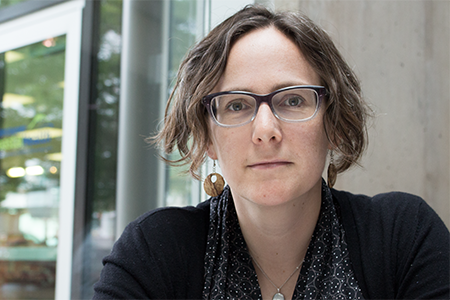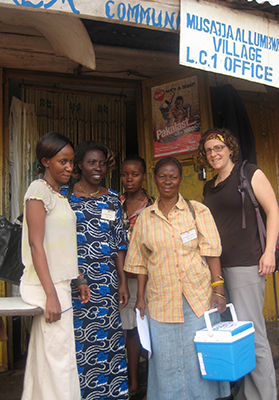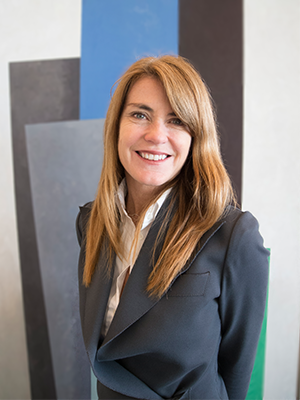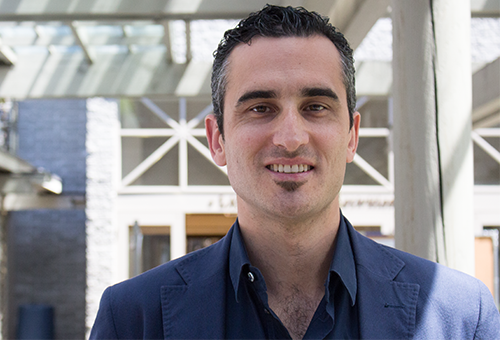UBC’s Clinician Investigator Program helps build the next generation of physician-scientists

Sheona Mitchell
For Sheona Mitchell the decision to pursue a career as a physician-scientist was not just about making an impact — it was about building long-term, sustainable healthcare solutions for some of the world’s most underserved populations.
“As a doctor, I didn’t want to be a medical tourist, I wanted to be a part of something more sustainable — and that’s what drew me to research,” says Dr. Mitchell, a former UBC resident, now working as an obstetrician gynecologist and researcher in Prince George.
Dr. Mitchell’s first introduction to life as a physician-researcher came during her time as a resident at UBC, while working with Gina Ogilvie, a professor, and principle investigator of the Advances in Screening and Prevention in Reproductive Cancers (ASPIRE) project in Uganda.
“It was an incredible opportunity, and one that really opened up my eyes to the world of health research,” says Dr. Mitchell, reflecting on her work with the community-driven initiative, seeking to reduce the burden of cervical cancer in Uganda, where it remains the leading cause of cancer among women.
The experience with ASPIRE left Dr. Mitchell looking for more research opportunities — and ultimately led her to pursue a two-year fellowship with UBC’s Clinician Investigator Program (CIP), which is designed to provide a combined research and clinical training stream for UBC residents in clinical specialty programs.
Narrowing the health inequality gap through research
Over the course of her time as a CIP fellow, Dr. Mitchell continued her research and work with ASPIRE, travelling to impoverished areas of Kampala, Uganda, where, under the supervision of Dr. Ogilvie, she piloted a HPV self-collection and cervical cancer screening program.

Sheona Mitchell with the ASPIRE team
“In low-income countries, like Uganda, there’s not the medical infrastructure or number of skilled professionals to provide the kind of screening programs that we have here in Canada. That’s why using a simple technology that allows women living in low-resource areas to collect their own swabs for HPV is so important,” explains Dr. Mitchell.
For Dr. Mitchell, it was time spent abroad, engaging face-to-face with the women of Kampala during her CIP fellowship, that helped solidify her passion for research and interest in becoming a physician-scientist long term.
“Research-clinicians have a big role to play in helping to narrow the health inequality gap,” says Dr. Mitchell. “It’s all about looking at the root causes of a problem and investing the time and energy to develop a tailored, evidence-based solution that is relevant to local realities.”
But Dr. Mitchell isn’t the only former CIP fellow helping to narrow the gap as a physician-scientist.
UBC general surgery resident Eiman Zargaran, who completed the CIP in 2014, is now working with a team of clinicians and medical software engineers to transform injury surveillance and trauma care in low-resources areas of the world using a simple, tablet-based application.
“You always have to be pushing the envelope,” says Dr. Zargaran, reflecting on his journey over the past several years, much of which was spent implementing the app in Cape Town, South Africa, with the support of his project supervisors, Morad Hameed, Assistant Professor of Surgery at UBC, and Andrew Nicol, the Director of the Trauma Department at Groote Schuur Hospital in Cape Town.
“It doesn’t matter whether you are working in the field of trauma or diabetes, you can’t improve the quality of care and patient outcomes unless you invest the time in researching and exploring what could be done better,” adds Dr. Zargaran, who hopes to continue balancing his clinical responsibilities as a surgeon with his appetite for research in trauma care once he completes residency in a few years.
Building the next generation of clinician-scientists

Siân Spacey, Director of UBC’s Clinician Investigator Program.
Since the Clinician Investigator Program first launched in 1997, over 90 fellows have completed the program.
“It’s so important to be increasing the number of physicians who are not only excellent clinicians, but conducting research that will lead to improved practice and patient care,” says Siân Spacey, who has served as the director of the CIP since 2005.
The program, which is fully funded by UBC’s Postgraduate Medical Education Office, offers a unique opportunity for residents to pursue two years of protected research. Today, seven residents are accepted each year — double the number compared to only a few years ago.
According to Dr. Spacey, interest in the program is on the rise, with the number of applications far exceeding the number of available positions each year — an indication of the program’s strong reputation and rate of success.
For Dr. Spacey — herself a former CIP fellow, now balancing her time as a neurologist, basic science researcher, and clinical associate professor at UBC — the program is not only about building the research skills of young physicians, but growing the next generation of clinician-scientists for B.C. and helping renew the clinical academic faculty at UBC.
Former UBC MD/PhD student, and Governor General Gold Medal Award recipient, Liam Brunham is just one of the many former CIP fellows who have returned to B.C. to pursue an academic position with UBC.
During his fellowship, Dr. Brunham’s research on the genetics of cardiovascular diseases and lipid disorders led him overseas to Singapore, where he conducted research activities at the Agency of Science, Technology, and Research (ASTAR) of Singapore, as well as the National University of Singapore.
“What drew me to UBC’s Clinician Investigator Program was the opportunity to conduct research abroad. For me, because I had already completed a lot of my training at UBC, I knew I wanted to gain more experience outside of B.C., and the research opportunities in Singapore were very attractive,” says Dr. Brunham.
After completing his research, under the supervision of UBC’s Dr. Michael Hayden, a professor in the Department of Medical Genetics and director of the Centre for Molecular Medicine and Therapeutics, Brunham spent an additional year in Singapore, gaining experience as an assistant professor of medicine at the National University.
Now, he’s back in Vancouver, where he’s accepted a position as an assistant professor of medicine with UBC. Dr. Brunham is also now working as an attending physician at Vancouver General Hospital and St. Paul’s Hospital, as well as a scientist at the Centre for Heart Lung Innovation, where he’ll continue conducting research into lipid disorders in hopes of developing new molecular diagnostic technologies that will lead to the development of new therapeutic options for patients.
Coming back to B.C.

Liam Brunham
Like so many graduates of the CIP, Dr. Brunham is excited about the role physician-scientists, like him, can play in B.C.’s healthcare system.
“There are many advantages to being a clinician, and doing research,” says Dr. Brunham, who recently received an Emerging Research Leaders Initiative grant from the Heart and Stroke Foundation of Canada, as well as an operating grant from the Canadian Institutes of Health Research (CIHR).
“You’re given opportunities to go back and forth from working in the lab to interacting with patients at the clinic. And then, essentially, it’s all about exploring and developing the linkages between your research and the medical problems you see, and being able to come back and make an impact on the patients you’re looking after. It’s a chance to really get involved in patient-oriented research.”
For UBC’s Associate Dean of Postgraduate Medical Education, Roger Wong, seeing former CIP fellows return to B.C. to pursue their careers as clinician-scientists is exciting.
“These individuals have incredibly diverse skillsets and it’s great to see them coming back to B.C. and making advances in medical research, and having an impact on the academic community at UBC,” says Dr. Wong.
For some, like Dr. Mitchell, who has recently moved to Prince George, the decision to focus closer to home was easy.
“Prince George was a perfect fit for me. There is a real need for evidence-based models of care in the north, where there are a number of at-risk, under-serviced populations,” says Dr. Mitchell.
And while Dr. Mitchell remains heavily involved in cervical cancer prevention research in East Africa, she’s now developing an evidence-based intervention for women in northern B.C. who struggle with problematic substance abuse during pregnancy, and post-partum.
When she’s not conducting research or working at her clinical practice, Dr. Mitchell can be found serving as an assistant professor with UBC’s Department of Obstetrics and Gynecology — a position, she believes, the CIP fellowship played a central role in helping her secure.
She may never have set out to be a physician-scientist-educator, but she’s certainly glad to have the opportunity to help train medical students enrolled at UBC’s Northern Medical Program, as well as residents based in Prince George. Now, as an educator, Dr. Mitchell’s helping to demonstrate to the next generation just how critical physician-researchers, like her, are when it comes to narrowing the gap between ‘bench’ and ‘bedside’, and creating long-term, sustainable healthcare solutions.